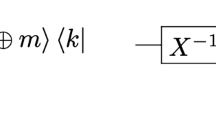Abstract
Methods of processing quantum data become more important as quantum computing devices improve their quality towards fault tolerant universal quantum computers. These methods include discrimination and filtering of quantum states given as an input to the device that may find numerous applications in quantum information technologies. In the present paper, we address a scheme of a classification of input states, which is nondestructive and deterministic for certain inputs, while probabilistic, in general case. This can be achieved by incorporating phase estimation algorithm into the hybrid quantum-classical computation scheme, where quantum block is trained classically. We perform proof-of-principle implementation of this idea using superconducting quantum processor of IBM Quantum Experience. Another aspect we are interested in is a mitigation of errors occurring due to the quantum device imperfections. We apply a series of heuristic tricks at the stage of classical postprocessing in order to improve raw experimental data and to recognize patterns in them. These ideas may find applications in other realization of hybrid quantum-classical computations with noisy quantum machines.








Similar content being viewed by others
References
Aaronson S (2015) Read the fine print. Nat Phys 11:291
Adcock J, Allen E, Day M, Frick S, Hinchliff J, Johnson M, Morley-Short S, Pallister S, Price A, Stanisic S (2015) Advances in quantum machine learning. arXiv:1512.02900
Amin MH, Andriyash E, Rolfe J, Kulchytskyy B, Melko R (2018) Quantum boltzmann machine. Phys Rev X 8:021050
Arunachalam S, Gheorghiu V, Jochym-O’Connor T, Mosca M, Srinivasan PV (2015) On the robustness of bucket brigade quantum RAM. New J Phys 17:123010
Biamonte J, Wittek P, Pancotti N, Rebentrost P, Wiebe N, Lloyd S (2017) Quantum machine learning. Nature 549:19
Cai X-D, Wu D, Su Z-E, Chen M-C, Wang X-L, Li L, Liu N-L, Lu C-Y, Pan J-W (2015) Entanglement-based machine learning on a quantum computer. Phys Rev Lett 114:110504
Degen CL, Reinhard F, Cappellaro P (2017) Quantum sensing. Rev Mod Phys 89:035002
Endo S, Benjamin SC, Li Y (2018) Practical quantum error mitigation for near-future applications. Phys Rev X 8:031027
Farhi E, Goldstone J, Gutmann S (2014) A quantum approximate optimization algorithm. arXiv:1411.4028
Granade CE, Ferrie C, Wiebe N, Cory DG (2012) Robust online hamiltonian learning. New J Phys 14:103013
Kandala A, Mezzacapo A, Temme K, Takita M, Brink M, Chow JM, Gambetta JM (2017) Hardware-efficient variational quantum eigensolver for small molecules and quantum magnets. Nature 549:242
Li Y, Benjamin SC (2017) Efficient variational quantum simulator incorporating active error minimization. Phys Rev X 7:021050
Li Z, Liu X, Xu N, Du J (2015) Experimental realization of a quantum support vector machine. Phys Rev Lett 114:140504
Lloyd S (2008) Enhanced sensitivity of photodetection via quantum illumination. Science 321:1463
McClean JR, Romero J, Babbush R, Aspuru-Guzik A (2016) The theory of variational hybrid quantum-classical algorithms. New J Phys 18:023023
McClean JR, Kimchi-Schwartz ME, Carter J, de Jong WA (2017) Hybrid quantum-classical hierarchy for mitigation of decoherence and determination of excited states. Phys Rev A 95:042308
Peruzzo A, McClean J, Shadbolt P, Yung M-H, Zhou X-Q, Love PJ, Aspuru-Guzik A, O’Brien JL (2014) A variational eigenvalue solver on a photonic quantum processor. Nat Comm 5:4213
Preskill J (2018) Quantum computing in the NISQ era and beyond. Quantum 2:79
Ristè D, da Silva MP, Ryan CA, Cross AW, Smolin JA, Gambetta JM, Chow JM, Johnson BR (2017) Demonstration of quantum advantage in machine learning. npj Quantum Information 3:16
Schuld M, Sinaiskiy I, Petruccione F (2015a) An introduction to quantum machine learning. Contemp Phys 56(2):1034
Schuld M, Sinayskiy I, Petruccione F (2015b) Simulating a perceptron on a quantum computer. Phys Lett A 379:660
Tan S-H, Erkmen BI, Giovannetti V, Guha S, Lloyd S, Maccone L, Pirandola S, Shapiro JH (2008) Quantum illumination with gaussian states. Phys Rev Lett 101:253601
Temme K, Bravyi S, Gambetta JM (2017) Error mitigation for short-depth quantum circuits. Phys Rev Lett 119:180509
Wiebe N, Braun D, Lloyd S (2012) Quantum algorithm for data fitting. Phys Rev Lett 109:050505
Wiebe N, Granade C, Ferrie C, Cory DG (2014) Hamiltonian learning and certification using quantum resources. Phys Rev Lett 112:190501
Zhukov AA, Remizov SV, Pogosov WV, Lozovik YE. (2018) Algorithmic simulation of far-from-equilibrium dynamics using quantum computer. Quantum Inf Process 17:223
Zhukov AA, Kiktenko EO, Elistratov AA, Pogosov WV, Lozovik YE (2019) Quantum communication protocols as a benchmark for programmable quantum computers. Quantum Inf Process 18:31
Acknowledgments
We acknowledge use of the IBM Quantum Experience for this work. The viewpoints expressed are those of the authors and do not reflect the official policy or position of IBM or the IBM Quantum Experience team. W. V. P. acknowledges a support from RFBR (project no. 19-02-00421).
Author information
Authors and Affiliations
Corresponding author
Additional information
Publisher’s note
Springer Nature remains neutral with regard to jurisdictional claims in published maps and institutional affiliations.
Rights and permissions
About this article
Cite this article
Babukhin, D.V., Zhukov, A.A. & Pogosov, W.V. Nondestructive classification of quantum states using an algorithmic quantum computer. Quantum Mach. Intell. 1, 87–96 (2019). https://doi.org/10.1007/s42484-019-00010-9
Received:
Accepted:
Published:
Issue Date:
DOI: https://doi.org/10.1007/s42484-019-00010-9




